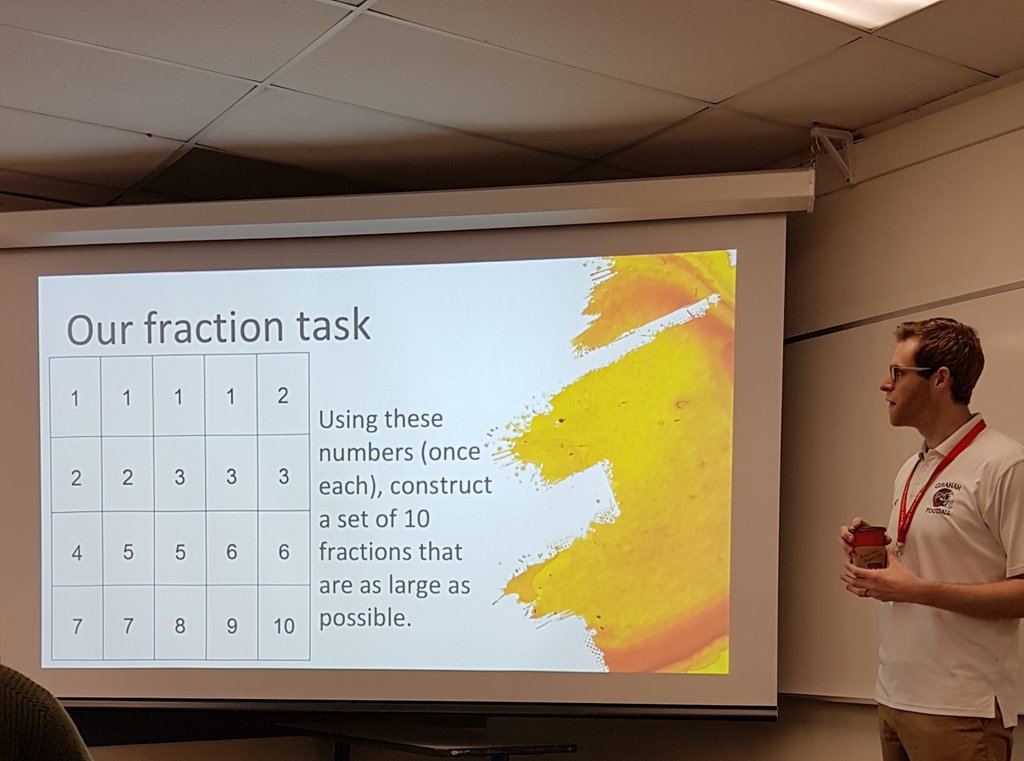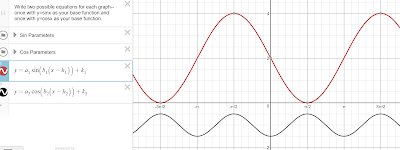
As we worked away and came up with our list Nat then said "Oh, I forgot to say that you can't use improper fractions." A few minutes later we were told that we couldn't use the same fraction twice, then later that we couldn't use equivalent fractions. Experiencing this as a student left me feeling like this:
But seeing Nat's teacher moves in action was remarkable. He looked at what each group had achieved and responded accordingly. His timing was perfect and he was a pro at not actually answering anyone's questions! I don't know who coined the term "facilitated chaos" but it is an apt description of the room during this type of task.
This was the kind of session that gets your brain going the more you think about it. And the more you think about it, the more connections you make which takes you deeper again. I'm not sure whether that makes any sense, but suffice it to say that it was great and has me excited to find way of incorporating this into my classroom on a regular basis. It didn't hurt that I was in a group with Sheri Walker, Fawn Nguyen and Jules Bonin-Ducharme and we laughed so much while having great mathematical discussions.
Nat's slides can be found here.
On the drive back to Ottawa, Sheri and I started brainstorming about how we could "teach like Nat". We are both currently teaching Calculus & Vectors so we came up with ideas that we could use in that course. Although we approached things differently - I had already taught cross product, whereas Sheri did this before teaching cross product - we both had very positive reactions.
Today was the day. My students sit in groups so I gave each group a whiteboard as their collaborative space. Here was the basic sequence I went through with my classes for the first challenge.
"Create two 3D vectors that are perpendicular to each other." I circulated and it was interesting to see their first responses. Most of them caused me to say "Oh, I forgot to tell you that you can't use 0." A few groans, but they carried on and came up with new vectors. Then I either said "Oh, you can't use the same number twice." or "Oh, you need to use integers." This eventually became "You must use integers from -9 to 9, but not 0, and they cannot be repeated." The next step was to make the sum of the magnitudes as large as possible. And each group genuinely felt like they could get the biggest magnitude. We had a list on the board of the current largest one. They were intensely engaged and oblivious to pretty much everything else going on. When things didn't work out, there was language used that was not appropriate but it was because they were so involved that they lost that filter. I overheard one student saying to a group mate "You're hella smart!" and another said "No, I won't let them win." No one was on their phone. No one was distracted. It was 100% engagement.
The second challenge (if they were willing to stop the first!) was to choose any two vectors and find a third vector that was perpendicular to both. I was astounded to see that some groups (of diligent, hard-working students) chose a hard path to figure this out because they actually didn't remember (know?) that this could be found simply using the cross product. (This was a good reminder for me - how often do they not learn what we teach?) They didn't even need me to restrict the constraints this time around - they did it themselves. Then I asked them to make the perpendicular vector have the largest magnitude possible. So far, I am winning this challenge, though I would not be surprised if someone comes in tomorrow with a bigger value.
Clearly, I loved this. But my students did too. When the bell rings and you hear "Why is class over?", you know it was a good class. So huge thank you to Nat and to Sheri. Speaking of Nat, he continues to inspire with tweets like this:
I want to do more of this! I would love to hear your ideas. We could get #teachlikeNat trending ;)
Oh - and you can all learn more from Nat in person at OAME 2019 in Ottawa. He is the latest addition to our list of Featured Speakers!






Thanks for sharing this. I wish I had attended his session. There were so many amazing presentations. Too bad they do not archive the presentations and make them available to OAME members.
ReplyDeleteDebbie